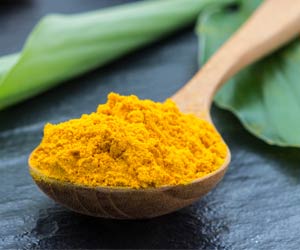Discover how turmeric offers a natural solution for indigestion, backed by research.
- Turmeric, through its active compound curcumin, alleviates indigestion symptoms effectively
- This natural remedy offers additional health benefits, such as antioxidant protection and mood improvement
- Safely increase turmeric intake through Golden Milk, Turmeric Tea, culinary uses, or supplements
Curcumin: A Potent Protectant against Esophageal and Gastric Disorders
Go to source). A small study conducted by researchers at Chulalongkorn University Faculty of Medicine in Bangkok compared the effectiveness of turmeric, specifically its active compound curcumin, to omeprazole—a common antacid—in relieving indigestion symptoms. Participants experienced significant reductions in symptom severity after taking turmeric supplements for 28 days, with improvements even more pronounced after 56 days.
Turmeric's curcumin fights inflammation and boosts bile production, aiding fat digestion and potentially easing indigestion from rich meals. #naturalremedy #digestivehealth #medindia’
Turmeric and Indigestion: the Link
Turmeric's effectiveness in alleviating indigestion symptoms can be attributed to its active compound, curcumin. Curcumin possesses anti-inflammatory and antioxidant properties that can reduce inflammation in the digestive tract and stimulate bile production, aiding in fat digestion. Unlike conventional antacids, which primarily work by reducing stomach acid production, turmeric addresses indigestion through its natural properties, potentially promoting a healthier gut environment.Pros of Turmeric for Indigestion Relief
- Natural and Widely Available: Turmeric is a natural spice that is readily available in most grocery stores and markets, making it accessible to a wide range of people.
- Fewer Side Effects: Compared to conventional medications like antacids, turmeric may have fewer side effects. This makes it an attractive option for individuals seeking relief from indigestion without the potential risks associated with pharmaceutical drugs.
- Additional Health Benefits: In addition to its potential for indigestion relief, turmeric offers a plethora of other health benefits. Its antioxidant properties help protect cells from damage caused by free radicals, while its support for brain health and potential mood improvement effects make it a valuable addition to overall wellness.
Cons of Turmeric for Indigestion Relief
- Interactions with Medications: Turmeric may interact with certain medications, particularly those that affect blood clotting. Individuals who are on blood-thinning medication, such as warfarin or aspirin, should exercise caution when using turmeric to avoid adverse effects.
- Gastrointestinal Irritation: Some people may experience gastrointestinal irritation when consuming large doses of turmeric or curcumin. This can manifest as symptoms such as stomach upset, diarrhea, or gastritis. Individuals with pre-existing gastrointestinal issues should be mindful of their turmeric intake and consult with a healthcare professional if necessary.
How to Safely Increase Turmeric Intake?
Incorporating turmeric into your diet can be both delicious and beneficial for your health.- Golden Milk: Prepare a warm beverage known as Golden Milk by heating milk (dairy or plant-based) with turmeric, a pinch of black pepper (to enhance curcumin absorption), and a touch of honey or sweetener to taste. This soothing drink is not only comforting but also packs a powerful anti-inflammatory punch.
- Turmeric Tea: Brew Turmeric Tea by steeping turmeric slices or powder in hot water. Add ginger and lemon for extra flavor and health benefits. Turmeric tea is refreshing and can be enjoyed throughout the day for its digestive and immune-boosting properties.
- Culinary Uses: Add turmeric powder to your favorite dishes such as curries, soups, stews, rice, and roasted vegetables. Turmeric adds a vibrant color and earthy flavor while providing numerous health benefits.
- Turmeric Supplements: Consider taking turmeric supplements if you prefer a more concentrated form or if it's challenging to consume turmeric regularly through food alone. Look for supplements that contain piperine (black pepper extract) to enhance curcumin absorption.
Dosage Recommendations
The optimal daily dose of turmeric can vary based on individual needs and health conditions. As a general guideline, aim for 1-3 grams of dried, ground turmeric or 400-600 milligrams of standardized curcumin extract per day. However, it's essential to consult with a healthcare professional for personalized advice, especially if you have existing medical conditions or are taking medications.
In summary, turmeric stands as a promising natural alternative to conventional medications for indigestion relief, backed by recent research highlighting its efficacy. The active compound in turmeric, curcumin, exhibits potent anti-inflammatory and antioxidant properties, making it a valuable ally in soothing digestive discomfort.
Ultimately, the choice between turmeric and conventional medications like antacids depends on individual circumstances, severity of symptoms, and professional medical advice. With informed decision-making and mindful consumption, turmeric can serve as a valuable ally in managing indigestion and promoting overall well-being.
Reference:
- Curcumin: A Potent Protectant against Esophageal and Gastric Disorders - (https://www.ncbi.nlm.nih.gov/pmc/articles/PMC6471759/)
Source-Medindia
















